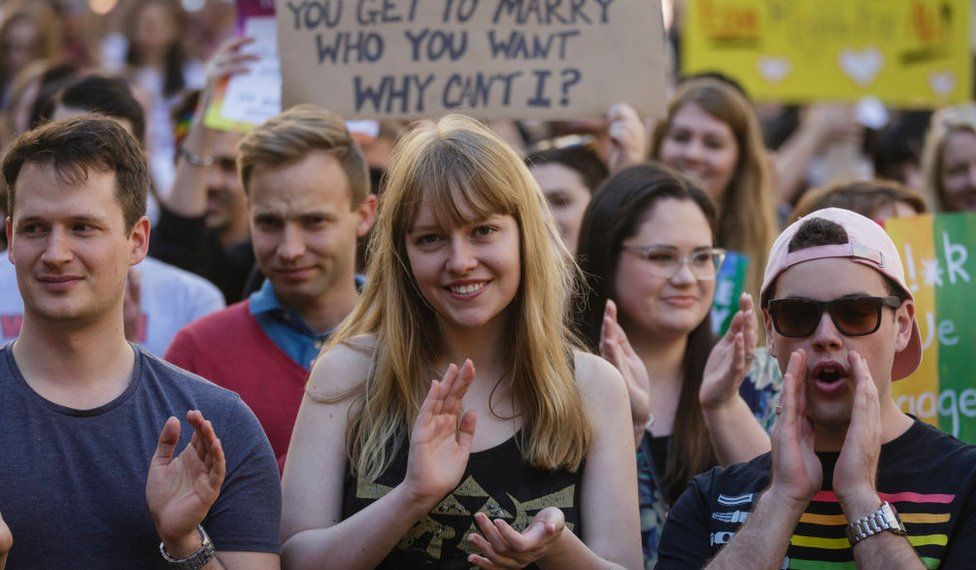Australia debates same-sex marriage postal vote
- Published

The Australian government plans to gauge support for same-sex marriage through a voluntary postal ballot after its divisive bill for a compulsory vote was again rejected by the Senate.
Same-sex marriage is not legal in Australia.
If the postal vote goes ahead and shows support for changing the law, the results will not be legally binding.
However, PM Malcolm Turnbull has said it could prompt a parliamentary vote to legalise same-sex marriage this year.
The postal plebiscite, as it is known, has been criticised by opponents as an unnecessary delay in resolving the debate, which they say could be settled immediately in parliament.
It will also face a legal challenge over whether it is constitutional.
How did debate arrive here?
The government had hoped to hold a compulsory national plebiscite, which, like the postal version, would not have bound MPs to a position.
However, the plan was voted down by the Senate in November and again on Wednesday, following opposition from Labor and other senators.
Opponents of the plebiscite did not necessarily oppose legalisation, but said the vote would be costly and fuel hate campaigns. They argued the matter should be put to a parliamentary vote.
Mr Turnbull's ruling conservative Coalition, which is split on the issue, believes a postal vote can be held without parliamentary approval.
Do Australians support same-sex marriage?
Recent polls have regularly shown a majority of people favour changing the law.
According to one released last week, 67% of women and 59% of men want to see same-sex marriage legalised.
Australian gay couple use marriage loophole
What would the postal vote entail?
The government has said ballots could be sent to Australians as early as 12 September. Responses would be due by 7 November, and the result would be public by 25 November.
Mr Turnbull said it would cost taxpayers A$122 (£74m; $96m) and be overseen by the Australian Bureau of Statistics (ABS).
However, same-sex marriage advocates - including an independent MP - have already planned a legal challenge to its constitutionality.
One point of contention is expected to be whether the ABS, rather than the Australian Electoral Commission, has the authority to oversee the vote.
What happens if the vote is successful?
If the postal vote proceeds and there is majority support for same-sex marriage, government MPs will be allowed a free vote to amend Australia's Marriage Act.
However, they will not be bound to vote in line with the public.
What does the opposition say?
Labor Senator Penny Wong said the move was expensive and would expose children to hatred, citing one lobby group's comments from 2013.
"The Australian Christian Lobby described our children as the stolen generation," Ms Wong, who is gay and has two children, told the Senate on Wednesday.
"We love our children and I object, as do every person who cares about children, and as do all those couples in this country, same-sex couples who have kids, to be told our children are a stolen generation."
However, government Senator Mathias Cormann said he was confident that Australians would debate the issue civilly.
"I agree with [Senator Wong] it is going to be very important for this debate to be conducted with courtesy and respect," he said.
- Published2 August 2017
- Published27 April 2017
- Published4 August 2017
- Published12 October 2016